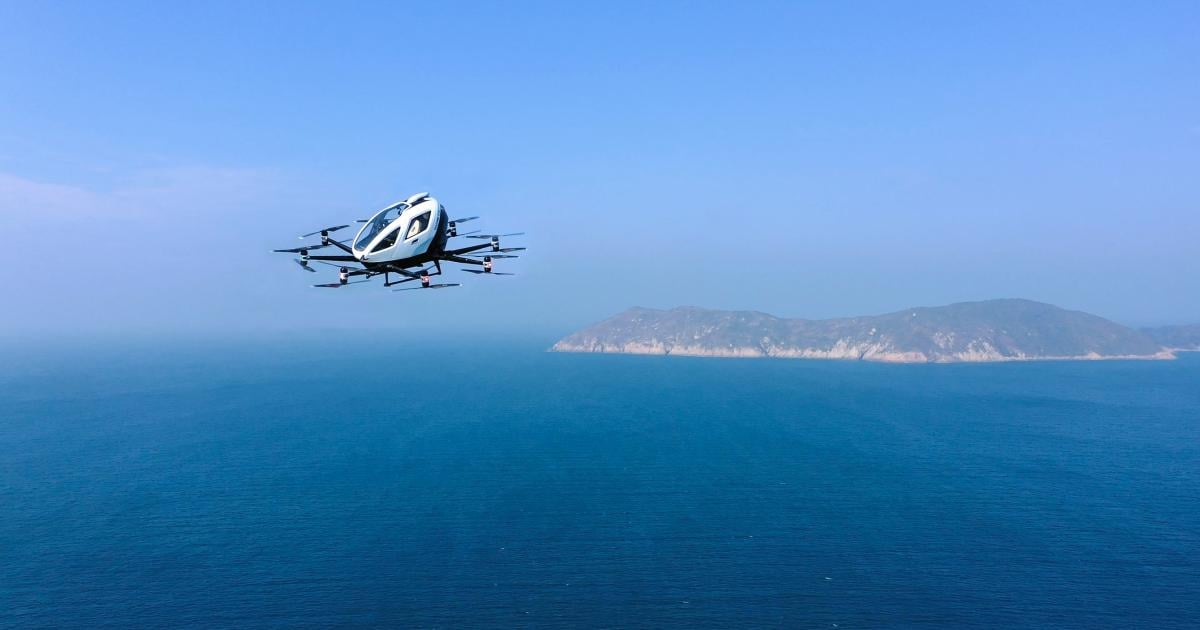|
Getting your Trinity Audio player ready...
|
While aerospace manufacturers around the world struggle to understand and respond to U.S. President Donald Trump’s tariffs and the prospect of an escalating trade war, Chinese eVTOL aircraft manufacturer EHang said it does not expect significant impacts on its operations despite sinking stock prices.
“Recent tariff measures announced by both [U.S. and Chinese] governments are not expected to have any material impact on EHang’s operations,” the company said in a statement issued April 4, two days after Trump announced sweeping global tariffs on what he dubbed “Liberation Day.” By April 9, the Trump administration had bumped China’s tariff rate up to 145%, while reducing tariffs on all other countries to a base rate of 10% for a 90-day period to allow time for negotiations.
“At present, the company does not export products to the U.S. market, and therefore, the recent tariff adjustments have no impact on existing revenue streams,” EHang said in a statement issued this week. According to EHang, China accounted for 95% of its revenues in 2024. Although the company remains focused on China, it also has plans to expand internationally to Thailand, Indonesia, Brazil, Japan, and the UAE.
EHang noted that it does not rely on any American-made products to manufacture its autonomous aerial vehicles, including the two-seat EH216 aircraft that is already operating in China.
“We do not use U.S.-restricted semiconductors, aerospace components, or other controlled technologies. Our supply chain remains secure and independent, ensuring no operational disruption due to trade policy changes,” the company said.
EHang became the first and only company to secure a type certificate from the Civil Aviation Administration of China (CAAC) for a passenger-carrying eVTOL aircraft in 2023, and it received an air operator certificate from the CAAC last month. It has been listed on the Nasdaq stock exchange since 2019.
Over the past month, EHang’s stock price has dropped by about 40%, closing on April 15 at $15.08. In the April 4 statement, EHang acknowledged that it’s experiencing “short-term share price fluctuations driven by market sentiment.”
“With localized production capabilities and a growing international presence across Asia, Europe, and other markets, EHang remains well-positioned to maintain business continuity and pursue long-term growth,” the company stated, adding that it will “continue to closely monitor international trade dynamics and adapt proactively.”
Tariffs Could Impact Foreign Imports for U.S. Manufacturers
Meanwhile, the impact of Trump’s tariffs on other eVTOL air taxi manufacturers remains unclear. U.S. frontrunners Archer and Joby are building their first scaled factories in Georgia and Ohio, respectively, but not all their components and systems are American-made. For example, both companies have selected Garmin avionics for their respective eVTOL aircraft, and Garmin has production facilities in China. Archer has also selected Taiwanese battery maker Molicel and Austrian aerostructures specialist FACC as suppliers for its Midnight eVTOL aircraft.
At Joby, whose main investor is Japanese automotive group Toyota, vertical integration is proving to be an advantage in these uncertain times, according to Joby chief product officer Eric Allison. “One of the things that we’ve done a little bit differently than others in our industry is we’ve really leaned on vertical integration, so we build nearly everything ourselves,” Allison said on April 10 during an Axios event in Washington. “So, we haven’t seen negative effects [from tariffs] right now, but obviously we’re carefully monitoring on an hour-by-hour basis as to what’s happening and how things will play out down the road.”
However, the wider impact of the tariffs could be set to escalate across an aerospace industry that is largely based on flexible international supply chains. According to a report in Bloomberg on April 15, the Chinese government has instructed the country’s airlines to suspend purchases of Boeing airliners. The U.S. airframer has not responded to the report, which was published soon after Ryanair chief executive Michael O’Leary said the European low-cost carrier may also defer Boeing orders.


